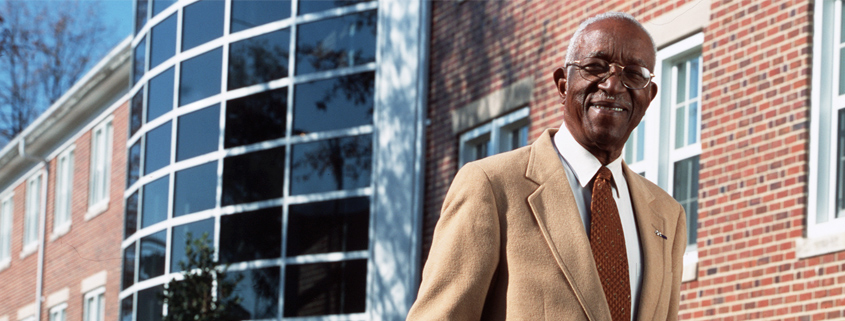The leader who shaped the discipline of African American history
John Hope Franklin, PhD
Fulbright U.S. Scholar, United Kingdom, 1954; Australia, 1960; Distinguished Fulbright U.S. Scholar, Venezuela, 1973; Zimbabwe, 1986; Brazil, 1987
Fulbright Foreign Scholarship Board, Member, 1962-1969, and Chair, 1966-69

An influential and prolific scholar of American history and civic leader, Dr. John Hope Franklin expanded understanding of America’s heritage through highlighting the contributions of African Americans. Throughout his career, he championed international education with his participation in the Fulbright Program as a U.S. Scholar and as the Chairman of the Fulbright Foreign Scholarship Board.
The son of a teacher and a lawyer, Dr. Franklin grew up in a small, segregated village in Oklahoma without any playgrounds, parks, or libraries before his family moved to Tulsa, Oklahoma. There, he moved to the prosperous Black neighborhood of Greenwood until the Tulsa Race Massacre of 1921 destroyed the district and forced his father to make the difficult decision to send his family back. His family persisted in their educational pursuits despite the few institutions available to them. When World War II broke out, Franklin volunteered his services as a clerical worker but was told he was the “wrong color” for the job. Dr. Franklin went on to graduate from Fisk University before earning masters and doctoral degrees from Harvard University. He dedicated himself to illuminating the African American contributions to American history, and opened the door to a new area of research and scholarship.
A groundbreaking historian, Dr. Franklin authored numerous American history texts chronicling the transformations of 20th Century United States, including his seminal 1947 publication, From Slavery to Freedom: A History of African Americans, and documented his remarkable life and times in the 2005 autobiography, Mirror to America.
The merits of his scholarship resulted in several Fulbright opportunities, first attending a 1954 Fulbright Conference on American Studies at the University of Cambridge in the United Kingdom, and later teaching and conducting research in Australia (1960), Venezuela (1973), Zimbabwe (1986), and Brazil (1987). He was appointed to the Fulbright Foreign Scholarship Board in 1962 and served as Chair of the Board from 1966 through 1969.
Studying and teaching at some of the nation’s leading institutions, he was a trailblazer as the first African American to be a graduate student in the department of history at Harvard University and the first African American chair of the history department at Brooklyn College and at University of Chicago. He also contributed to academic excellence by teaching at several HBCUs, including Fisk, St. Augustine’s University, North Carolina Central University, and Howard University. He led Phi Beta Kappa, the United States’ oldest and most prestigious academic honor society, as its president and was also the president of several of the largest history associations in the United States, including the American Historical Association. He concluded his distinguished academic career teaching legal history at Duke University School of Law.
Outside of the classroom, Dr. Franklin wrote and worked alongside notable public figures, including the Reverend Dr. Martin Luther King, Jr., Dr. W.E.B. Du Bois, and the Honorable Thurgood Marshall, and worked with civic organizations like the Children’s Defense Fund to build community support for education and support of the younger generation.
Dr. Franklin received countless awards for his incisive work, including more than 100 honorary degrees. Most notably, he received the Presidential Medal of Freedom, the nation’s highest civilian honor, in 1995. The American Academy of Arts and Letters awarded him the Gold Medal in History, and the United States Library of Congress presented him with the John W. Kluge Prize for Lifetime Achievement in the Study of Humanity. He was selected to serve as chair of the Advisory Board to One America in 1997, and was the Founding Chairman of the Smithsonian National Museum of African American History and Culture (NMAAHC) Scholarly Advisory Committee.
For his contributions, he was recognized with the Fulbright Association’s 2007 Fulbright Lifetime Achievement Award, which honors Fulbright alumni whose “distinguished careers and civic and cultural contributions have sought to expand the boundaries of human wisdom, empathy, and perception.”
After more than 70 years of writing and teaching, Dr. John Hope Franklin’s words live on at the National Museum of African American History and Culture. Featured prominently in the entrance hall’s exhibit space, his words advise: “We’ve got to tell the unvarnished truth.” He never stopped working to provide knowledge and mentorship for younger generations, and pursuing his vision of an America that offers opportunity for all. Dr. Franklin lived in Durham, North Carolina until his death in 2009 at the age of 94.
An influential and prolific scholar of African American history, Dr. John Hope Franklin expanded the American consciousness, blazed a trail for scholars of color, and championed international education. Committed to education and justice, Dr. Franklin’s participation in and support of the Fulbright Program as a U.S. Scholar and Chairman of the Fulbright Foreign Scholarship Board benefitted local and global communities, one connection at a time.